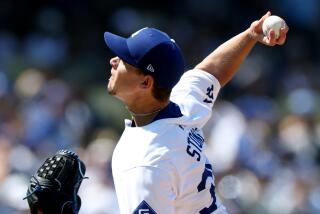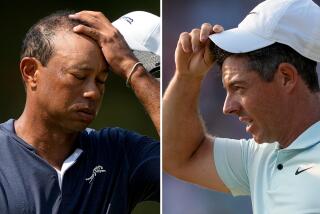Who made the decision that golf needs a hurry-up offense?
- Share via
Gentlemen, start your Titleist Pro Titaniums!
So the golfing gods will decree this weekend when the best players in the world are sent racing through in the final days of the PGA Championship at Hazeltine National.
It will be artistry rushed. It will be drama hurried. If last weekend was any indication, it could be greatness lost.
That the PGA Tour begins its tournaments with a shot clock is a necessity.
That it finishes them with same clock is an outrage.
Just ask Tiger Woods and Padraig Harrington, the hallowed being treated like hackers Sunday at the World Golf Championships Bridgestone Invitational in Akron, Ohio.
Locked in a head-to-head duel on the 16th hole of the final day, nobody behind them, drama ahead of them, viewers transfixed by them, Woods and Harrington were accosted by an official with a mandate.
Play faster
Play faster?
If two great actors were engaged in a taut final act, would you hurry them off the stage? If two heavyweight fighters were locked in a brutal bout, would you urge them to finish up?
It was a bad decision for the fans, and a worse one for Harrington, as he tried to rush his way out of trouble and wound up taking a triple bogey, turning his one-shot lead into a three-shot deficit that cost him the tournament.
It was such a shame, even the permanently pressed Woods was in a wrinkle, immediately criticizing the PGA Tour for ruining a good thing.
“We were having such a great battle . . . and it got influenced from the outside,” he reiterated to reporters Tuesday at his news conference before the PGA at Chaska, Minn. Woods said he was not fined for criticizing a rules official, but he added, “When we were put on the clock, it certainly changed everything.”
Now it should change everything else, the PGA Tour needing to throw away the clock for the final two rounds of a tournament, with reduced fields and higher stakes allowing theater to trump timeliness.
Not that slow play isn’t a golfing problem. It has long been the bane of golfers everywhere, from the duffer spending 10 minutes trying to find his ball to the perfectionist spending three minutes trying to find his swing.
“You’ve always got a guy out there who, when it’s his turn, he’s trying to reenact the third act of ‘Macbeth,’ ” said Eddie Merrins, the golf pro emeritus at Bel Air Country Club. “I’d say it might be the biggest problem affecting local clubs today.”
Merrins has been summoned by cellphone to hurry golfers clogging up the course, only to be confronted with a famous actor or top executive who could just not bring himself to swing.
The biggest arguments of his career have come from slow players.
The biggest hassles have come from players stuck behind them.
“The thing about the slow player is, once he is told about it, he becomes even slower,” Merrins said. “He just can’t help himself.”
Although Merrins agrees that fast play has to be enforced with the average Sunday golfer, he agrees the PGA Tour may have blown it Sunday.
“They have to mentor play and they can’t play favorites, but, on the other hand, [Woods and Harrington] were the last pairing,” he said. “They weren’t holding anything up. The call was questionable.”
Once a player is on the clock, he is allowed 40 seconds to take fairway shots and 60 seconds for putts. But in the player’s mind, it’s not about the time, it’s about the threat.
If they are ruled to be in violation, they could be penalized a stroke. No matter that no player has actually been assessed this penalty since 1982. The threat is still there, and it can turn tough players timid.
“The doubt creeps in, and you end up making a little mistake because you’re not settled on it,” Harrington said.
Granted, athletes should be able to compete under all conditions, and certainly any of those Tampa Bay Rays trying to hit strikes amid booing fans in a blinding rainstorm last October would laugh at these golfers.
But although fans shouldn’t have had to endure that soggy World Series, they also shouldn’t have to endure a rushed golf ending.
“A golfer gets into a certain rhythm, and, absolutely, to hurry that golfer changes that rhythm, and it can change everything,” Merrins said.
Although Harrington is a notoriously slow player, this was shaping up to be a glorious finish that should been given all the time it required.
Seriously, what was the rush?
Long sports events are something that draw complaints only from journalists, it seems. Fans love overtime football games and extra-inning baseball games.
Even if Tiger Woods is just standing on the fairway yawning and eating an apple, fans love to see him for as long as they can. The argument that the match has to end early for television is also silly because, after all, longer matches mean more commercials and inherently more drama that is better for television.
When Wood tees off at Hazeltine on Thursday as an overwhelming favorite to win his first major of the season, his partner will be -- surprise -- Harrington.
It’s understandable that they, like all golfers, should be asked to keep a steady pace on the first two days to avoid pushing the tournament into darkness. But whoever survives into the weekend should also survive the clock.
There should be no mechanical limits placed upon this eternally human test. This magic will end the moment someone wins a golf tournament with a last-second putt or a buzzer-beating chip.
--
More to Read
Go beyond the scoreboard
Get the latest on L.A.'s teams in the daily Sports Report newsletter.
You may occasionally receive promotional content from the Los Angeles Times.











